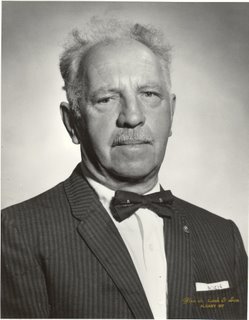 My uncle Harry Honig was a Nassau Justice of the Peace and then Town Supervisor during the onset of the Cold War. He was genuinely civic-minded, although he undoubtedly enjoyed the social aspects and perks of his offices. As part of the Civil Defense effort during the Truman years, he spent many hours as a volunteer of the Ground Observer Corps sitting in the stands of the old Nassau Fairgrounds racetrack watching for Russian airplanes, dutifully calling in any aircraft he sighted to the Civil Defense filter center in Albany. [That program had one very embarrassing local incident: A teenage aircraft volunteer spotter at the Alfred E. Smith State Office Building in Albany reported a multi-engine aircraft flying north over the Hudson River. There was no flight plan for such an aircraft, and the Civil Defense alerted the Air Force. Two fighter jet aircraft were scrambled from Westover Air Force Base near Worcester, Massachusetts to intercept it, and they almost fired upon President Truman’s personal aircraft, The Independence, which was ferrying Secretary of State Dean Atchison to Canada.]
My uncle Harry Honig was a Nassau Justice of the Peace and then Town Supervisor during the onset of the Cold War. He was genuinely civic-minded, although he undoubtedly enjoyed the social aspects and perks of his offices. As part of the Civil Defense effort during the Truman years, he spent many hours as a volunteer of the Ground Observer Corps sitting in the stands of the old Nassau Fairgrounds racetrack watching for Russian airplanes, dutifully calling in any aircraft he sighted to the Civil Defense filter center in Albany. [That program had one very embarrassing local incident: A teenage aircraft volunteer spotter at the Alfred E. Smith State Office Building in Albany reported a multi-engine aircraft flying north over the Hudson River. There was no flight plan for such an aircraft, and the Civil Defense alerted the Air Force. Two fighter jet aircraft were scrambled from Westover Air Force Base near Worcester, Massachusetts to intercept it, and they almost fired upon President Truman’s personal aircraft, The Independence, which was ferrying Secretary of State Dean Atchison to Canada.]As Town Supervisor, Harry received a stream of civil defense information and he became well versed in the dangers of the nuclear age. Harry studied civil defense maps of fallout patterns and concluded that Nassau would receive radioactive fallout carried by the prevailing westerly winds even if the bomb fell as far away as Chicago. In fact, most of the east coast of the United States was vulnerable.
One area that appeared safe from nuclear war was the Isle of Pines, part of Cuba. Like much of the Caribbean area, it was south of the United States, and the winds would not deposit radioactive fallout on it even if the United States were to be attacked. Harry was a farmer, and he read that the Isle of Pines had rich farmland that he could acquire very inexpensively by American standards. After the farming season was over in the fall of 1958, Harry and Frieda headed to Cuba to search out farmland so that they could create a home that was safe from nuclear war. Unfortunately, they arrived there at about the same time as did Fidel Castro’s rebel army, and they spent a couple of days holed up in their hotel as the Cuban revolution went through. Harry immediately grasped that although they might be safe from radioactive fallout in Cuba, they would face perhaps greater danger from the revolution. Harry and Frieda next scouted out Arizona but found the hot climate disagreeable and the land unsuitable for his type of farming. Reluctantly, they returned to Nassau.
Harry was not one to give up easily. He promptly had a large underground concrete fallout shelter constructed behind his home using a plan obtained from a civil defense organization. The shelter had a hand-powered air pump that brought in outside air through a filter, and he stocked the shelter with canned water, food, fallout shelter crackers, and a battery-operated radio.
After a while, the nuclear threat diminished, and the shelter became dank and probably the home to creatures that like living in such an environment. In his later years, it was forgotten, fortunately without ever having been used.